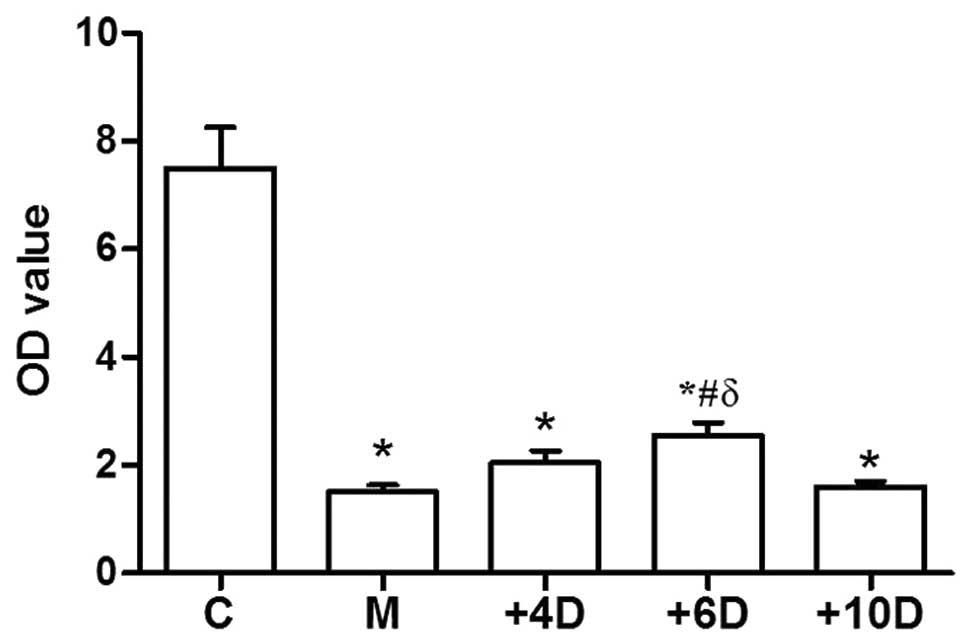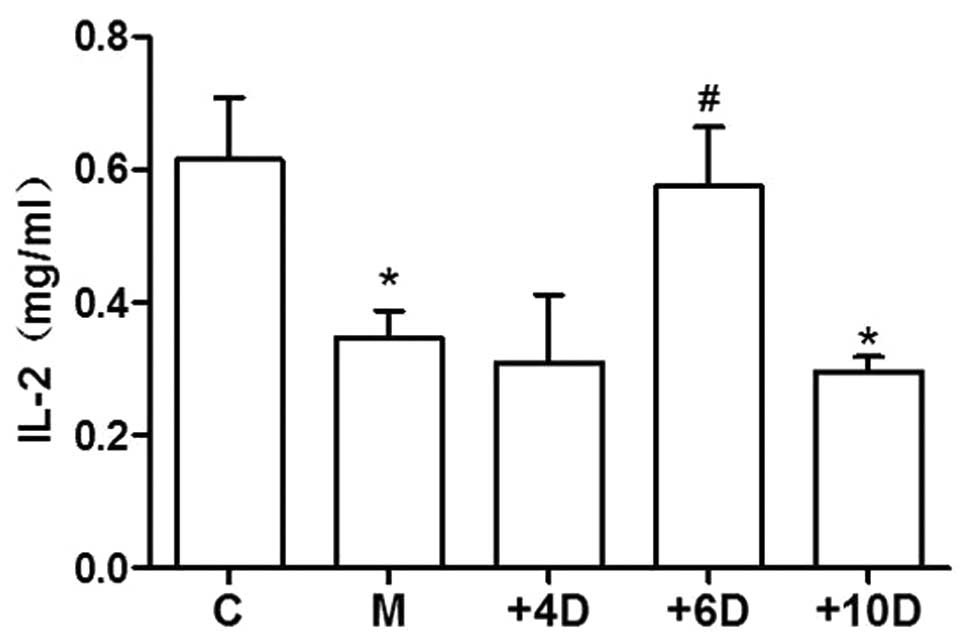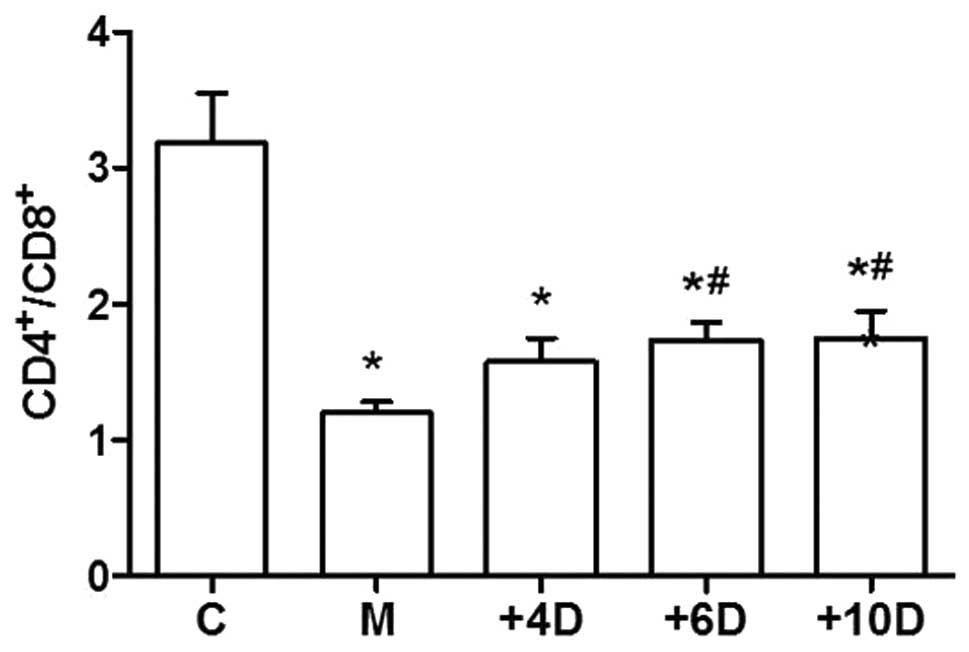|
1
|
Wang Y, Zhu J and DeLuca HF: Where is the
vitamin D receptor? Arch Biochem Biophys. 2012 Jul 1;523(1):
123–133. View Article : Google Scholar : PubMed/NCBI
|
|
2
|
Overbergh L, Decallonne B, Valckx D,
Verstuyf A, Depovere J, Laureys J, Rutgeerts O, Saint-Arnaud R,
Bouillon R and Mathieu C: Identification and immune regulation of
25-hydroxyvitamin D-1-alpha-hydroxylase in murine macrophages. Clin
Exp Immunol. 120:139–146. 2000. View Article : Google Scholar : PubMed/NCBI
|
|
3
|
Hewison M, Freeman L, Hughes SV, Evans KN,
Bland R, Eliopoulos AG, Kilby MD, Moss PA and Chakraverty R:
Differential regulation of vitamin D receptor and its ligand in
human monocyte-derived dendritic cells. J Immunol. 170:5382–5390.
2003. View Article : Google Scholar : PubMed/NCBI
|
|
4
|
Prietl B, Treiber G, Pieber TR and Amrein
K: Vitamin D and immune function. Nutrients. 5:2502–2521. 2013.
View Article : Google Scholar : PubMed/NCBI
|
|
5
|
Soilu-Hänninen M, Airas L, Mononen I,
Heikkilä A, Viljanen M and Hänninen A: 25-Hydroxyvitamin D levels
in serum at the onset of multiple sclerosis. Mult Scler.
11:266–271. 2005. View Article : Google Scholar : PubMed/NCBI
|
|
6
|
Correale J, Ysrraelit MC and Gaitán MI:
Immunomodulatory effects of vitamin D in multiple sclerosis. Brain.
132:1146–1160. 2009. View Article : Google Scholar : PubMed/NCBI
|
|
7
|
Staples JA, Ponsonby AL, Lim LL and
McMichael AJ: Ecologic analysis of some immune-related disorders,
including type 1 diabetes, in Australia: Latitude, regional
ultraviolet radiation, and disease prevalence. Environ Health
Perspect. 111:518–523. 2003. View
Article : Google Scholar : PubMed/NCBI
|
|
8
|
Ruiz-Irastorza G, Egurbide MV, Olivares N,
Martinez-Berriotxoa A and Aguirre C: Vitamin D deficiency in
systemic lupus erythematosus: Prevalence, predictors and clinical
consequences. Rheumatology (Oxford). 47:920–923. 2008. View Article : Google Scholar : PubMed/NCBI
|
|
9
|
Ye YL, Li ZX and Ye XM: Influence of 1,
25-dihydroxyvitamin D3 on variation of peripheral blood lymphocyte
subsets in guinea pigs with experimental autoimmune
encephalomyelitis. J Chin Gen Pract. 11:391–393. 2008.(In
Chinese).
|
|
10
|
Wu J, Zhang J, Hou GH, Cui YB, Wang C and
Chen J: Effect of 1α,25-dihydroxyvitamin D3 on T helper cell 17 and
expression of related cytokines in penetrating keratoplasty in
mice. Chin J Pathophysiol. 30:2226–2231. 2014.(In Chinese).
|
|
11
|
Luwen C, Liqing T and Ruiping Y: Study of
impact of vitamin D in immune function and infections in patients
with type 2 diabetes. Chin J Nosocomiol. 25:1106–1109. 2015.
|
|
12
|
Dezhi L, Zehua Z, Litao L and Zhengqi C:
Effection of vitamin D deficiency to T lymphocyte subgroups in
spinal tuberculosis Chin. J Orthop. 20:448–450. 2012.
|
|
13
|
Cantorna MT, Snyder L, Lin YD and Yang L:
Vitamin D and 1,25(OH)2D regulation of T cells. Nutrients.
7:3011–3021. 2015. View Article : Google Scholar : PubMed/NCBI
|
|
14
|
Wang C, Wu J, Hou GH, Chen J, Qi WJ, Cui
YB and Zhang J: The immuno-regulation effect of
1,25(OH)2D3 on T lymphocytes. J Guangdong
Med. 34:3114–3116. 2013.
|
|
15
|
Gao WW, Wang Y, Zhang XR, Yin CY, Hu CM,
Tian M, Wang HW and Zhang X: Levels of
1,25(OH)2D3 for patients with pulmonary
tuberculosis and correlations of 1,25(OH)2D3
with the clinical features of TB. J Thorac Dis. 6:760–764.
2014.PubMed/NCBI
|
|
16
|
Panda DK, Miao D, Tremblay ML, Sirois J,
Farookhi R, Hendy GN and Goltzman D: Targeted ablation of the
25-hydroxyvitamin D 1alpha -hydroxylase enzyme: Evidence for
skeletal, reproductive, and immune dysfunction. Proc Natl Acad Sci
USA. 98:7498–7503. 2001. View Article : Google Scholar : PubMed/NCBI
|
|
17
|
Schedel M, Jia Y, Michel S, Takeda K,
Domenico J, Joetham A, Ning F, Strand M, Han J, Wang M, et al:
1,25D3 prevents CD8(+)Tc2 skewing and asthma development through
VDR binding changes to the Cyp11a1 promoter. Nat Commun.
7:102132016. View Article : Google Scholar : PubMed/NCBI
|
|
18
|
Ooi JH, McDaniel KL, Weaver V and Cantorna
MT: Murine CD8+ T cells but not macrophages express the vitamin D
1α-hydroxylase. J Nutr Biochem. 25:58–65. 2014. View Article : Google Scholar : PubMed/NCBI
|
|
19
|
Kongsbak M, von Essen MR, Levring TB,
Schjerling P, Woetmann A, Ødum N, Bonefeld CM and Geisler C:
Vitamin D-binding protein controls T cell responses to vitamin D.
BMC Immunol. 15:352014. View Article : Google Scholar : PubMed/NCBI
|
|
20
|
Lu Z, Jin M, Huang M and Wang Y and Wang
Y: Bioactivity of selenium-enriched exopolysaccharides produced by
Enterobacter cloacae Z0206 in broilers. Carbohydr Polym.
96:131–136. 2013. View Article : Google Scholar : PubMed/NCBI
|
|
21
|
Yan G, Xi Y, Xu S, Chen J, Lin Y, Dai H,
Cheng P, Xiao H, Liu Z and Qi Z: Inhibiting accelerated rejection
mediated by alloreactive CD4(+) memory T cells and prolonging
allograft survival by 1α,25-dihydroxyvitamin D(3) in nude mice.
Immunol Lett. 149:54–61. 2013. View Article : Google Scholar : PubMed/NCBI
|
|
22
|
Prehn JL and Jordan SC: Incubation of T
cell or monocytic cell lines with 1,25-dihydroxyvitamin D3 before
mitogen stimulation potentiates IL-2 and IL-1 beta mRNA levels.
Transplant Proc. 21:90–91. 1989.PubMed/NCBI
|
|
23
|
Dhur A, Galan P, Preziosi P and Hercberg
S: Lymphocyte subpopulations in the thymus, lymph nodes and spleen
of iron-deficient and rehabilitated mice. J Nutr. 121:1418–1424.
1991.PubMed/NCBI
|
|
24
|
Zhao L, Jiang Z, Jiang Y, Ma N, Wang K and
Zhang Y: Changes in immune cell frequencies after cyclophosphamide
or mycophenolate mofetil treatments in patients with systemic lupus
erythematosus. Clin Rheumatol. 31:951–959. 2012. View Article : Google Scholar : PubMed/NCBI
|
|
25
|
Wang FY, Su M, Zheng YQ, Wang XG, Kang N,
Chen T, Zhu EL, Bian ZX and Tang XD: Herbal prescription Chang'an
II repairs intestinal mucosal barrier in rats with
post-inflammation irritable bowel syndrome. Acta Pharmacol Sin.
36:708–715. 2015. View Article : Google Scholar : PubMed/NCBI
|
|
26
|
Harrer A, Pilz G, Wipfler P, Oppermann K,
Sellner J, Hitzl W, Haschke-Becher E, Afazel S, Rispens T, van der
Kleij D, et al: High interindividual variability in the CD4/CD8 T
cell ratio and natalizumab concentration levels in the
cerebrospinal fluid of patients with multiple sclerosis. Clin Exp
Immunol. 180:383–392. 2015. View Article : Google Scholar : PubMed/NCBI
|
|
27
|
Hadrup SR, Strindhall J, Køllgaard T,
Seremet T, Johansson B, Pawelec G, Straten P thor and Wikby A:
Longitudinal studies of clonally expanded CD8 T cells reveal a
repertoire shrinkage predicting mortality and an increased number
of dysfunctional cytomegalovirus-specific T cells in the very
elderly. J Immunol. 176:2645–2653. 2006. View Article : Google Scholar : PubMed/NCBI
|
|
28
|
Yin Y, Qin J, Dai Y, Zeng F, Pei H and
Wang J: The CD4+/CD8+ ratio in pulmonary
tuberculosis: Systematic and meta-analysis article. Iran J Public
Health. 44:185–193. 2015.PubMed/NCBI
|
|
29
|
Serrano-Villar S, Sainz T, Lee SA, Hunt
PW, Sinclair E, Shacklett BL, Ferre AL, Hayes TL, Somsouk M, Hsue
PY, et al: HIV-infected individuals with low CD4/CD8 ratio despite
effective antiretroviral therapy exhibit altered T cell subsets,
heightened CD8+ T cell activation, and increased risk of non-AIDS
morbidity and mortality. PLoS Pathog. 10:e10040782014. View Article : Google Scholar : PubMed/NCBI
|

















